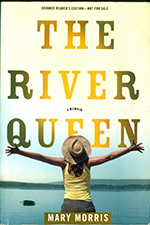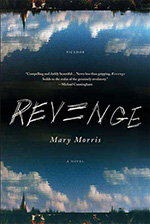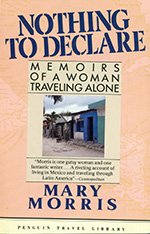
I'm going to repeat once more what my teacher John Gardener said because it continues to resonate for me in almost everything I do. There are only two plots in all of literature. You go on a journey or the stranger comes to town. Or as Stanley Elkin put it more succinctly when referred to science fiction: They come here or we go there.
I have also written how women, for so long denied the journey, awaited the stranger. Vermeer clearly understands women awaiting the stranger in so many of his portraits of women, especially those who stand in front of maps of a world they will never see. But I come from a more fortunate generation of women and I have gone a lot of places.
For me a journey is quite simply a story unto itself. In a sense it comes ready made, at least the literal story does. On the road things happen. You meet people. You take a detour. A bus drops you off at the wrong stop. Someone offers to help you find your way. And you find yourself in the middle of a narrative you had never anticipated.
Take the instance of an old story of mine that I remain very fond of. "The Typewriter." It appears in my collection THE BUS OF DREAMS. A number of years ago I traveled through Europe with my then boyfriend who insisted on carrying a typewriter to an old friend of his family. We were supposed to spend six weeks backpacking, but now the typewriter took over our entire trip. We had to be careful with it. We couldn't leave it alone. He had to carry it. Anyway it became a story. I wrote the first several drafts out in a very literal fashion, but it didn't work. Then I returned to it, after a long time, and realized that the typewriter had to become a character. It had to know something that the couple carrying it does not. And once I took the story out of its literal realm and allowed imagination to come in, the story came together for me.
I've met many odd people and found many stories on the road. Last year I stayed in Sicily with a woman whose house was decorated with old dresses she once wore to prom and things like that. I know she will find her way into something. A few years ago we did a house exchange in the Loire Valley. It was the coldest summer in recorded history and, despite the blazing fire in the fire place in mid-August I was freezing. So one day I tried on a sweater that belonged to the woman we were exchanging with. It was a perfect fit. I tried on her sweat pants. They fit too. I began walking around the house in her clothes. I started thinking to myself "What if all her clothes fit? What if I just moved into her life." A story called "Exchanges" (published in DAEDALAS) came out of that "What if."
I am always asking myself what if I push myself further. What if I make a character do what I would never do. What if you go to Belgium and the old lady who lives next door, the mother of the man with whom you have exchanged, dies while you are on holiday? See my story, "The Dead Woman." (In TRIQUARTERLY). The possibilities for narratives are endless. So many stories and novels I love involve a journey - ROOM WITH A VIEW, ENCHANTED APRIL, SHELTERING SKY, POISONWOOD BIBLE, and of course the classics - THE ODYSSEY, GULLIVER'S TRAVELS. MOBY DICK to name a very few.
You go on a journey and, by definition, something happens. Some stories, such as Paul Bowles disturbing "A Distant Episode" show what happens when we push ourselves beyond the natural limits of travel as does Joseph Conrad when he penetrates the HEART OF DARKNESS. But whether you are writing as E.M. Forster or Bowles, the task is still to push your material beyond what you know and to bring imagination to bear.
In terms of telling stories that is. To ask yourself "What if that person I traveled with actually was a shady character?" "What if the old woman died while we were staying in their house?" What if you went somewhere and decided never to return." Falling in love, growing up, losing your innocence, facing mortality. All the greatest themes of literature can come from the stories and people we meet, no matter how fleetingly, on the road.
I met a man once in an airport who wore a button on his shirt. The button fell to the ground and I picked it up to hand it to him. He explained to me it was a picture of his wife. Seven years ago she walked out the front door of their home. That morning she had made everyone breakfast. She had attended a child's performance at school. She went to work, came home for lunch. And then she left. No signs of a struggle. No money missing. She'd left behind her purse, phone, everything. But she'd locked the door and walked away from her life.
To this day her story haunts me. It is one I cannot fathom and also cannot forget. This is a woman who appears to have walked out of her own life. At times when I cannot sleep I wonder what was the journey she embarked upon.










Beautiful, generous essay. You've brought together so many parts of your travel and writing life, while at the same time giving us a roadmap of sorts for our own fictive reflections. Just love it.
ReplyDeleteOh, darling, thank you soooo much. That is what I am trying to do here. Bringing all this work under one roof. I was happy to include your pic! I added the photo credit, by the way. xox
ReplyDelete